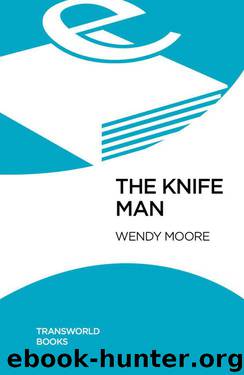The Knife Man by Moore Wendy

Author:Moore, Wendy [Moore, Wendy]
Language: eng
Format: epub, azw3
ISBN: 9781409044628
Publisher: Transworld
Published: 2010-09-29T18:30:00+00:00
11
The Chaplain’s Neck
‘Dr Dodd seemed to be willing to die, and full of hopes of happiness.’
James Boswell1
London, June 1777
ON SUNDAY, 22 June 1777, the Reverend William Dodd was not delivering his customary sermon. Instead he sat in his dismal cell in Newgate prison composing a desperate appeal to Samuel Johnson in a last-minute effort to save his life. Dodd, a foolish and foolhardy clergyman who enjoyed the good life as much as good works, was sentenced to hang in five days’ time. Since the beginning of the year, his predicament had become a cause célèbre; news of his legal battle filled the newspaper columns and his fate had gripped the nation.2
Having been ordained a priest some twenty years earlier, Dodd had devoted himself more to physical than spiritual pleasures. He threw himself into the social whirl of Georgian society, published a novel, and dressed in the dandiest of fashions, earning himself the nickname ‘the Macaroni Parson’. He was a generous benefactor to numerous charities, not least the Magdalen House for ‘fallen women’, where he was made official chaplain. Although his sermons were popular – he had been appointed a chaplain to the King in 1763 – ultimately his extravagant lifestyle led to his downfall. With debts mounting, he staged an amateurish attempt to forge a bond for a hefty £4,200 – upwards of £250,000 in today’s terms – in the name of his erstwhile patron, Lord Chesterfield. After the inevitable discovery of his fraud, he was found guilty of forgery at the Old Bailey in February 1777 and in May he was sentenced to hang.
Dodd’s plight provoked an eruption of popular feeling demanding a reprieve. A petition with twenty-three thousand signatures pleading for a royal pardon was presented to George III, and Samuel Johnson, who had met Dodd once briefly, agreed to lend his powers of persuasion to the cause. The illustrious writer wrote an impassioned speech which Dodd addressed to the Old Bailey, as well as an eloquent sermon which he delivered to his fellow prisoners at Newgate, and after Dodd’s last appeal for help on the Sunday before his expected execution Johnson came again to his aid by ghost-writing a poignant letter to the King.
Despite Johnson’s well-chosen words, the media sympathy and the mass public support, all was in vain. No royal pardon arrived, and on 27 June crowds turned out to watch as Dodd was transported to Tyburn. ‘On this occasion there was perhaps the greatest concourse of people ever drawn together by a like spectacle,’ reported the Gentleman’s Magazine. ‘From Newgate to the place of execution the streets were thronged, and never were seen so many weeping eyes.’3 Yet even as Dodd felt the noose around his neck, he had not lost hope of being saved. If Johnson’s talents could not prevent him from dying, he fully believed John Hunter’s skills would bring him back from the dead.
Not far from the sobbing crowds, at an undertaker’s parlour in Goodge Street, Hunter was waiting with a number of medical friends to receive the curate’s body.
Download
This site does not store any files on its server. We only index and link to content provided by other sites. Please contact the content providers to delete copyright contents if any and email us, we'll remove relevant links or contents immediately.
Fanny Burney by Claire Harman(26588)
Empire of the Sikhs by Patwant Singh(23064)
Out of India by Michael Foss(16838)
Leonardo da Vinci by Walter Isaacson(13299)
Small Great Things by Jodi Picoult(7108)
The Six Wives Of Henry VIII (WOMEN IN HISTORY) by Fraser Antonia(5492)
The Wind in My Hair by Masih Alinejad(5082)
A Higher Loyalty: Truth, Lies, and Leadership by James Comey(4942)
The Crown by Robert Lacey(4794)
The Lonely City by Olivia Laing(4792)
Millionaire: The Philanderer, Gambler, and Duelist Who Invented Modern Finance by Janet Gleeson(4455)
The Iron Duke by The Iron Duke(4341)
Papillon (English) by Henri Charrière(4247)
Sticky Fingers by Joe Hagan(4179)
Joan of Arc by Mary Gordon(4085)
Alive: The Story of the Andes Survivors by Piers Paul Read(4013)
Stalin by Stephen Kotkin(3949)
Aleister Crowley: The Biography by Tobias Churton(3626)
Ants Among Elephants by Sujatha Gidla(3452)
